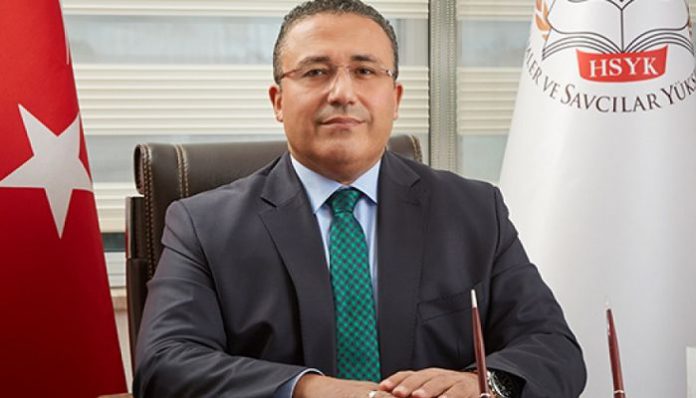Deputy Chairman of the Supreme Board of Judges and Prosecutors (HSYK) Mehmet Yılmaz has denied a previously made statement and said confessor prosecutors and judges will not be allowed return to their posts in the Justice Ministry.
“No worries. The HSYK will not return anyone who avails themselves of the Effective Repentance Law to duty again. Our board is determined on this issue,” said Yılmaz, speaking to columnist Sevilay Yükselir.
Thousands of judges and prosecutors have been suspended by the HSYK while many have been detained or arrested on the grounds that they have links to the Gülen movement, which is accused by the Turkish government of masterminding a failed coup attempt on July 15.
Speaking to the Anadolu news agency on Oct. 21, Yılmaz had said: “At the general assembly, we will discuss keeping those [suspended] judges and prosecutors in their jobs whose confessions [related to the Gülen movement] are helpful and important.”
Recalling his previous statement, Yılmaz said: “I made that statement merely to encourage confessions, and it was very successful. There were no confessions at that time, but after I issued the statement, many were obtained. By means of more than 200 confessors we gathered evidence on the FETÖ membership of 2,400 judges and prosecutors.”
FETÖ is a derogatory term coined by the Justice and Development Party (AKP) government to refer to members of the Gülen movement.
Following a vote in its General Assembly gathered in The Hague on Dec. 8, the European Networks of Councils for the Judiciary (ENCJ) suspended the observer status of the HSYK and excluded it from participation in ENCJ activities for the mass suspension and dismissal of judges and prosecutors and the failure to comply with the European Standards for Councils for the Judiciary.
“The HSYK does not currently comply with the ENCJ Statutes and is no longer an institution which is independent of the executive and legislature ensuring the final responsibility for the support of the judiciary in the independent delivery of justice,” said a statement issued following the vote in the ENJC General Assembly, which convened in The Hague to discuss and decide on the position of the HSYK in the association.
The ENCJ underlined that it has been following developments in the judiciary in Turkey since 2014 and has expressed its concern both in its correspondence with the HSYK and publicly in the Declaration of the Hague (June 2015), the Declaration of Warsaw (June 2016) and more recently after the mass suspension of judges and prosecutors and again following their dismissal.
Acknowledging the huge impact and subsequent national trauma caused by the events of an attempted coup on July 15, the ENCJ said, “Those responsible should be made accountable through an open, fair and impartial judicial process conforming with international standards.”
“Taking into account the failure of the HSYK to satisfy the ENCJ that its standards have been complied with, the statements of the HSYK, as well as information from other sources including the reports and statements of the European Parliament, the European Commission, the Human Rights Commissioner of the Council of Europe and Human Rights Watch and the Venice Commission, the ENCJ decided that the actions and decisions of the HSYK, and therefore the HSYK as an institution cannot be seen to be in compliance with European Standards for Councils for the Judiciary,” said the ENCJ in the statement.
“Therefore, the HSYK does not currently comply with the ENCJ Statutes and is no longer an institution which is independent of the executive and legislature ensuring the final responsibility for the support of the judiciary in the independent delivery of justice.”
“The General Assembly accordingly resolved to suspend, with no Council voting against, the observer status of the HSYK. Therefore, the HSYK is, for the time being, excluded from participation in ENCJ activities,” said the statement, adding that “the ENCJ is however open to staying in contact with the HSYK and is prepared to offer its assistance and guidance in setting out and compliance with the European Standards for Councils for the Judiciary.”
Justice Minister Bekir Bozdağ announced in a statement on Nov. 10 that the HSYK had expelled 3,456 judges and prosecutors over links to the Gülen movement since July 15. According to the Turkey Purge website, 3,843 prosecutors and judges have been purged by the government in the same period.



